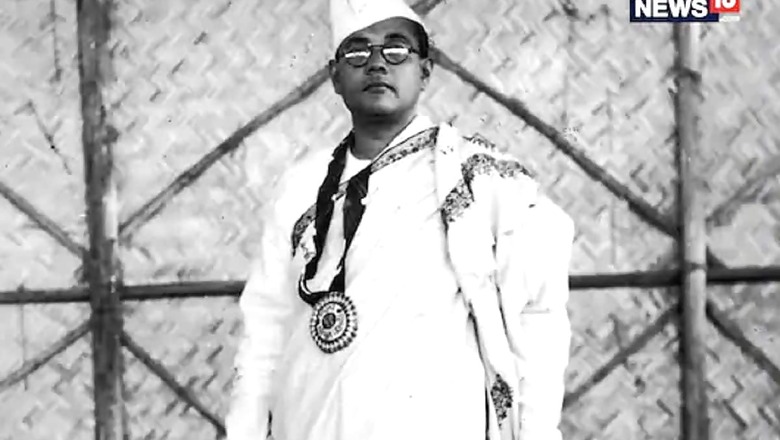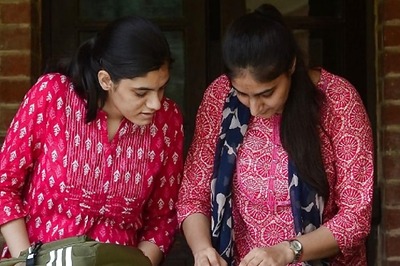
views
In an incessant quest for unravelling the mystery behind Netaji Subhas Chandra Bose’s disappearance, admirers of Netaji have repeatedly asked three vital questions: How, when, and where did Netaji breathe his last? Successive governments in India have refused to divulge the truth. Full and final declassification of the crucial files pertaining to Netaji and the Indian National Army (INA) has never been undertaken. Any celebration in the name of his birth anniversary ought to be accompanied by an obvious question: When is his death anniversary?
After decades of research on the life and works of Subhas Chandra Bose, I can certainly say that there has been a systematic conspiracy to obliterate his work from the pages of history. This is an international conspiracy. However, to date, Netaji is one of the few leaders who is widely revered across India, and is held in high esteem in several parts of Southeast Asia and Japan.
The British, too, admired Subhas Chandra Bose for his burning patriotism. The British premier who oversaw the transfer of power in India, Clement Attlee, admitted in 1956 that the British had to leave the country in haste due to the patriotic fervour ignited by Subhas Chandra Bose and his INA. Prior to that, Dr. B. R. Ambedkar in his interview with the BBC in 1955 had clearly stated the reason behind Britain’s hasty departure from India— “because of the national army raised by Subhas Chandra Bose”.
A question may well be asked, what made Netaji so special? In a world like ours, ridden with strife over petty identities that have reduced our societies into a cocoon of self-aggrandizement, where intolerance has given rise to bloody conflicts, where discord is easily triggered in the name of race, religion and gender, where holding to power by hook or crook is considered normal, Netaji is more relevant than ever.
In post-1947 India, there has only been petty politics (rajniti), and no statecraft, least of all, a robust national or state policy (deshniti or rashtraniti). Netaji’s deeds embodied statecraft and formulation of a robust nation-building policy, combined with astounding foresight and an uncompromising selfless dedication and planning for national reconstruction. All these were reflected in his speeches and in his actions during his association with C.R. Das in pre-Independence Calcutta, as well as during his time as the Head of the Provisional Government of Free India (Azad Hind).
Believed in Gender equality
On 21 October 1943, Netaji announced in Singapore the formation of the Provisional Government of Azad Hind. A striking feature of this government was the raising of an all-woman regiment. It was reported that the occasion “saw the birth of the first army of Indian sisters. Girls in their teens crowded the camp and threw themselves heart and soul into intensive military training.” Despite stiff opposition from within the Indian community, as well as the Japanese generals, Netaji brought about parity between men and women. To date, we are struggling to achieve gender equality in various spheres of life. This Rani of Jhansi Regiment became the first women’s contingent in Asia.
ALSO READ| Subhash Chandra Bose Birth Anniversary: Kalka Mail Gets a New Name For its Role in Netaji’s Great Escape
Netaji’s valour, righteousness and the spirit of sacrifice, as well as his fellow-feeling for the soldiers of the INA are incomparable. His commitment to the safety of the members of the women’s regiment and the INA was paramount. During enemy’s aerial bombardment and machine-gun assault, Netaji refused to take shelter until the last of his volunteers had taken refuge. At the end of the war, when the Japanese offered him a car but did not arrange transport for his soldiers, Netaji refused to travel alone. He marched from Rangoon (Yangon) to Bangkok through the jungles for three weeks with his soldiers, braving the enemy’s assault. His empathy towards his combatants greatly impressed everyone, including the Japanese authorities. When the war was over, Bose quickly disbanded the women’s regiment and sent the girls back home before the enemy could discover their identity. He did this to protect their honour.
Upheld secular values
Netaji’s infinite knowledge of military affairs astounded Col. Prem Kumar Sahgal who later recounted his days with him. Netaji’s unflinching faith in India’s ability to win struck everyone. Sahgal wrote, “No amount of wealth, power or honour could make him deviate from his one-point zeal to break the shackles of India’s slavery. He was so much above the ordinary run of politicians that he detested power politics. He believed in letting the masses decide what form of government they would like to have.”
The Japanese authority was impressed with Netaji’s stern insistence on maintaining the autonomy and honour of the INA, while other ethnic groups were invariably subjugated by the Japanese. Sleeping only three hours a day, Netaji worked untiringly for the cause of India’s liberation.
Netaji believed in communal harmony. Once he was invited to a temple ceremony, but he is known to have refused to attend it without his Muslim generals. The temple authority had to relent. Food for the INA soldiers was prepared in a secular kitchen. There was no separate site for any religious congregation; everyone was expected to pray at a common venue. In Singapore, he used to often visit Ramakrishna Mission, but never interfered with the spiritual practices of his soldiers. The secularism that Indian politicians post-1947 trumpeted was practiced by Netaji in all sincerity.
A vision for the future
Bose all along opposed Indian servility of the British Raj. He kept his promise by hoisting the Indian flag on 30 December 1943 in the Andamans. He had already renamed the Andamans as Shaheed Islands and Nicobar as Swaraj Islands. But the names of the islands were never retained in post-1947 India. Nor was Netaji remembered as the founder of the Planning Commission, which he set up in 1938. Nor was he given the credit for having sent a medical mission to China in 1938.
The war in Manipur is another such forgotten chapter that needs to be re-read. The INA War Museum in Moirang (where the Indian Tricolor was hoisted on 14 April 1944) suffers from utter neglect. While stationed in Southeast Asia, Netaji had built a powerful administrative infrastructure for a post-independence India by training personnel. He went to the extent of printing currency notes, coins, and even postal stamps with the word Azad Hind inscribed on them.
A powerful enemy of the British
Unfortunately, none of these momentous acts was ever recorded in our history books, nor any members of the Indian Independence League or the INA were appointed by the Jawaharlal Nehru administration after 1947. Nehru also deprived the INA soldiers of the freedom fighter’s pension. The INA fighters, especially the 26,000 who were martyred in the battlefield along the Northeastern borders, have never been honoured by the Ministry of Defence as true war-heroes. Nor does the Defence Ministry display any photograph of Subhas Bose in its premises. We as a nation have failed to honour the Man of Valour and his soldiers who had fought against the British. To date, honour is conferred upon those who died protecting the British Empire—Look at the India Gate in New Delhi.
ALSO READ| Subhash Chandra Bose Jayanti: May Netaji’s Ideals Help Towards Building Self-reliant India, Says PM Modi
The British so dreaded Bose’s aligning with the anti-British forces—the Axis Powers—that Churchill ordered his assassination in 1941. His raising an army that could challenge the British rule unnerved the latter to such extent that some British spies in February 1944 were sent twice to assassinate Bose while he was in Burma. This demonstrates that Bose was a powerful enemy of the British Empire.
The stigma of fascism wrongly attached to Netaji was removed by British intelligence officer Hugh Toye and American historians Joyce Lebra and Leonard Gordon through their biographies and historical accounts on Bose, and not by the court historians in India.
A strategist
On 24 December 1944, Netaji addressed a mammoth rally in Singapore and shared his assessment of the Second World War. The IIL published a booklet titled Netaji’s Masterly Survey of War in East and West. He covered the inner contradictions of the Allied Powers—Russia versus the Anglo-Americans; the hostility between Britain and America, and the threat Britain felt in maintaining its naval force in the Pacific. Britain was apprehensive of Australia and Canada falling under the American influence. Bose’s analysis of the post-war political scenario was unerring.
Subhas Chandra Bose in his relentless quest for achieving freedom for India devised a strategy to bring about a Sino-Japanese rapprochement. By advocating peace between China and Japan, Bose sought greater Japanese military involvement in the Indian cause, since the majority of Japanese forces were busy controlling China. He sought to divert the entire Japanese focus towards fighting the Anglo-Americans in India, letting the Chinese seek liberation from Japan. It is widely acknowledged that following Bose’s advice, Japan refused to declare war against the Soviet Union. Japan was already fighting on two fronts and waging a war against Russia would have opened a third front. Bose’s advice was accepted by Japan, especially after the defeat of Germany and Italy by mid-1945.
Netaji’s forming of an army was solely directed towards fighting the British colonizers in India, and never against any other power. Therefore, the Free Indian Legion raised by Bose in Germany refused Hitler’s order to fight against the Soviet Union. As a result, several Indian soldiers were mercilessly executed by Hitler. Similarly, Bose refused to send his men to fight the anti-Japanese guerrilla groups from China and Burma. During the INA Trials at Red Fort, Japanese diplomat and later Foreign Affairs Minister Shigemitsu Mamoru and many other Japanese who had come for the deposition declared that the INA or Bose were never puppets of Japan. In fact, historian Joyce Lebra called Bose the “weakest ally” of Japan.
These instances show that Bose and the INA were far ahead of others in terms of dedication, consciousness and conscience.
Let us truly cherish Netaji’s legacy with utmost sincerity for all times to come.
Read all the Latest News, Breaking News and Coronavirus News here




















Comments
0 comment